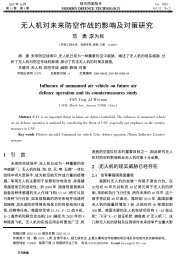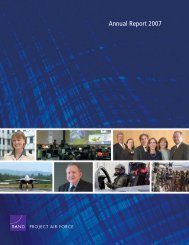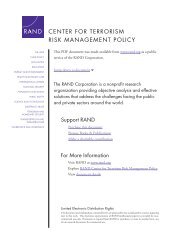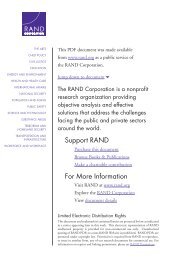How Terrorist Groups End - RAND Corporation
How Terrorist Groups End - RAND Corporation
How Terrorist Groups End - RAND Corporation
Create successful ePaper yourself
Turn your PDF publications into a flip-book with our unique Google optimized e-Paper software.
<strong>How</strong> <strong>Terrorist</strong> <strong>Groups</strong> <strong>End</strong> 25<br />
Consequently, they are influenced by cost-benefit calculations.<br />
Resorting to terrorism has benefits if a group can successfully achieve<br />
its goals. But it also has costs. <strong>Terrorist</strong>s must be constantly underground<br />
and on the run, because government security forces are trying<br />
to capture or kill them. Terrorism provokes repression that some organizations<br />
believe they cannot survive. As Martha Crenshaw noted,<br />
“some revolutionaries perceive government strength as an obstacle to<br />
using terrorism.” 48 Hans-Joachim Klein, a former West German terrorist,<br />
wrote that the experience of participating in a terrorist action<br />
(seizing ministers from the Organization of the Petroleum Exporting<br />
Countries [OPEC] in Vienna in 1975) convinced him to abandon the<br />
underground. He was tired of being constantly on the run and living<br />
covertly, and he could not adjust to a set of beliefs he regarded as callous<br />
and cynical with regard to human life. 49<br />
This is why politics cannot always be viewed as separate from<br />
policing. In some cases, opportunities for collective action, such as mass<br />
protest, may occur independently of government actions. But government<br />
action may also be a catalyst. An effective coercive policy against<br />
terrorist groups can make terrorism too dangerous and unproductive<br />
to continue—even in cases in which government security forces are<br />
unable to capture or kill key members of the group. The government<br />
response can contribute to the internal costs of terrorism by provoking<br />
organizational disagreements. Other costs associated with terrorism<br />
may be more significant than the direct or indirect penalties that<br />
governments can exact, especially in democracies. One of the most<br />
important costs is the withdrawal of popular support. The attitude of<br />
an initially sympathetic community on which any terrorist organization<br />
depends may change as a result of terrorist actions. 50 This is sometimes<br />
referred to as backlash. 51<br />
48 Crenshaw (1996, p. 254).<br />
49 Hans-Joachim Klein, La Mort Mercenaire: Témoignage d’un Ancient <strong>Terrorist</strong>e<br />
Oust-Allemand, Paris: Seuil, 1980.<br />
50 Crenshaw (1996, pp. 262–266).<br />
51 Ross and Gurr (1989); Ted Robert Gurr, “Terrorism in Democracies: Its Social and Political<br />
Bases,” in Walter Reich, ed., Origins of Terrorism: Psychologies, Ideologies, Theologies, States

















